Black Friday and Cyber Monday are two of the biggest shopping days of the year—with good reason. Retailers offer amazing deals on everything from electronics to clothing to home goods. But with so many bargains to choose from, it’s easy to fall for fake shopping websites.
Fake shopping websites are designed to look like real websites, but they’re actually scams. These websites will often offer incredibly low prices on popular items, but they’ll never actually deliver the products you order. In some cases, fake shopping websites aim to steal your credit card information.
To help you avoid fake shopping websites, we’ve compiled a list of 25 websites to avoid during big shopping holidays.
Jump to…
What are scam websites?
How do fake websites work?
The 10 different types of scam websites
The latest list of scamming websites
Other suspected scam shopping sites
How to avoid being scammed when shopping online
What to do if you buy something from a scam shopping site
What are scam websites?
Scam websites are illegitimate online platforms designed to trick users into revealing personal information and financial details, or infecting their devices with harmful software like malware. Scammers often use fake websites to impersonate legitimate businesses, organizations, or government entities. This helps them to gain users’ trust and exploit them.
A few of the key characteristics of scam websites include:
- Deception and impersonation: Scam websites go to great lengths to mimic the look and functionality of genuine platforms. They copy logos, layouts, and content, making it hard for users to spot the deceit.
- Solicitation of personal information: Scammers aim to collect sensitive data like names, addresses, contact information, and social security numbers. This information can be used for identity theft, scams, or even sold on the black market.
- Financial exploitation: Fake websites may coerce individuals into providing financial details such as credit card numbers or banking credentials. This allows scammers to commit financial fraud, including unauthorized transactions and draining victims’ accounts.
- Malware dissemination: Some scam websites are equipped with harmful software meant to infiltrate users’ devices. Once infected, these devices can be remotely controlled, leading to data theft or even ransom demands.
- Social engineering tactics: Scam websites use persuasive language, false endorsements, and fabricated customer reviews to gain users’ trust. These tactics create a false sense of credibility.
How do scam websites work?
Fake websites have one clear objective: to deceive users into handing over their personal information or cash. They employ several tactics to achieve this:
Phishing attacks
Scammers send deceptive emails or text messages, appearing to be from legitimate sources. These messages often contain a link to a counterfeit website. When users fall for this and enter their login credentials or personal information, the scammer gains unauthorized access.
Fake shopping websites
These platforms promise unbeatable prices but never deliver the goods. Some go further, stealing users’ credit card information.
Malware distribution
Fake websites can serve as launching pads for malware. This insidious software infiltrates devices, causing a range of issues, from data theft to device takeover. They spread malware through bogus downloads, malicious links, or intrusive pop-up ads.
Social media and forums
Scammers exploit these platforms to spread their deceit. They use enticing posts and comments to lure users to their fraudulent sites.
Search engine ads
Scammers pay for deceptive ads that lead users to their fake websites. These ads often use tempting language or unbeatable offers to lure unsuspecting individuals.
Bot comments
Automated bots flood comment sections with links to fake sites. These comments may seem legitimate, but they’re designed to trick users into clicking on the provided links.
The 10 different types of scam websites
Scam websites come in various forms, each with its own modus operandi. The various categories of scam websites include:
1. Phishing websites
These sites impersonate trusted entities like banks or social media platforms, tricking users into revealing login credentials and personal information.
2. Fake shopping websites and discount landing pages
These platforms promise low prices for products they have no intention of delivering, and some may attempt to steal users’ credit card information.
3. Malware distribution websites
Functioning as hubs for harmful software, these sites infect devices with viruses, Trojans, or spyware, leading to a host of issues including data theft.
4. Tech support scams
Scammers pose as tech support agents, aiming to gain remote access to devices or sell unnecessary software or services.
5. Investment scams
These schemes promise high returns on fictitious investment opportunities, ultimately resulting in financial loss for the victims.
6. Charity scams
Scammers pose as legitimate charities, soliciting donations that often never reach their intended recipients.
7. Fake ticket-selling sites
These platforms falsely offer tickets to events or travel at attractive prices, but they rarely deliver the promised tickets.
8. Clone websites
These mimic authentic platforms, aiming to deceive users into providing sensitive information or engaging in fraudulent transactions.
9. Scareware sites
Using fake virus alerts or pop-ups, these sites attempt to persuade users to pay for phony solutions or services.
10. Scam contest websites
These sites lure users with fake contests, often requiring an upfront fee or personal information for entry. Winners rarely receive the promised prizes.
The latest list of suspected scamming websites
There are thousands, if not millions, of fake websites on the internet currently. However, in light of the shopping holidays, we’re focusing on scam shopping websites so you know what to look out for when taking part in this year’s sales.
Here’s a list of the top suspected fake websites to avoid this Black Friday and Cyber Monday:
1. PiloSaleLtd[.]com or PiloLtd[.]com
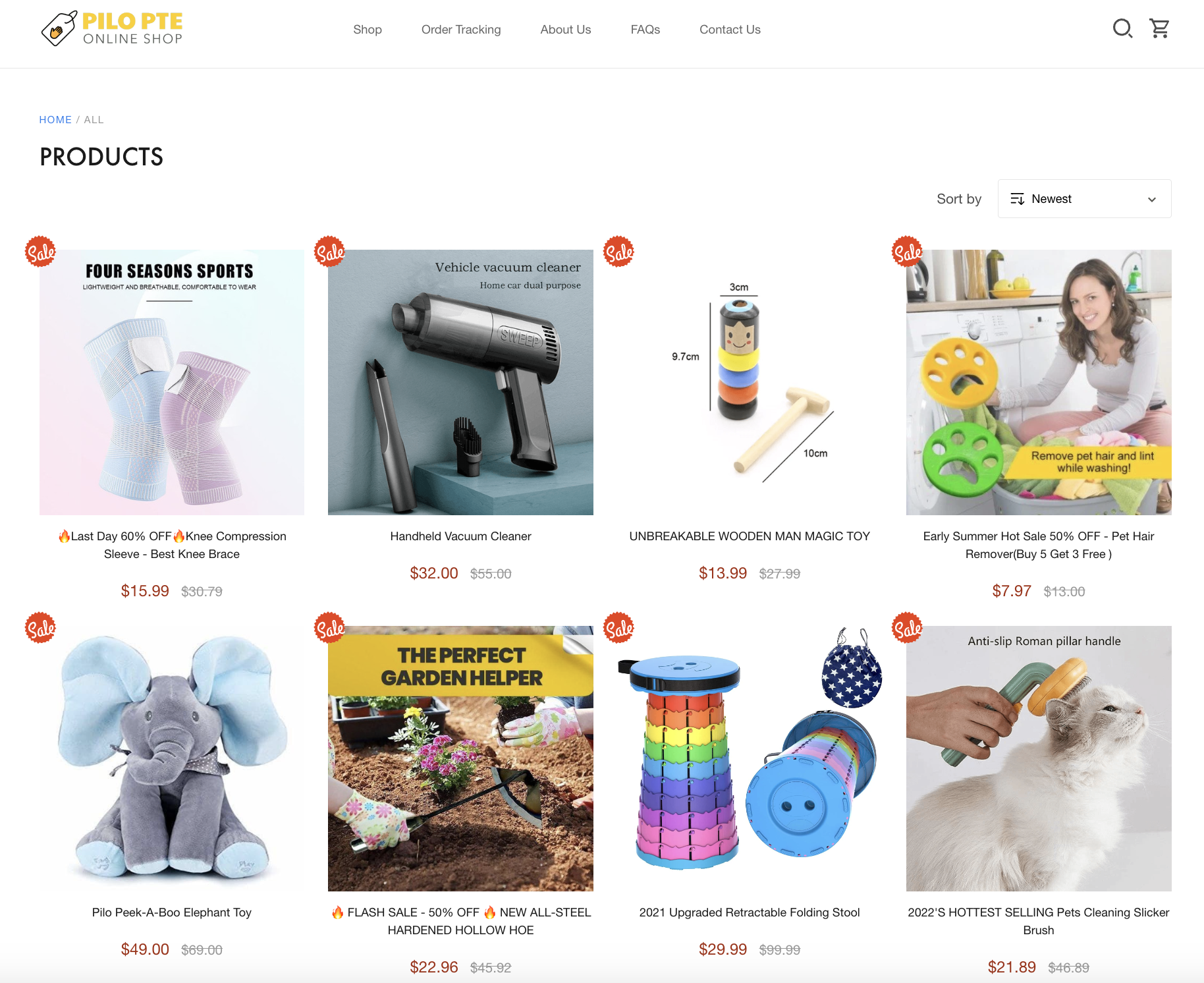
These dodgy sites are almost identical clones of one another. They both claim to sell small items ranging from electronic goods to children’s toys. Both exhibit several red flags commonly associated with scam sites:
- Low rating Trustpilot rating: Their Trustpilot rating is alarmingly low, holding a 1.6-star rating from 21 reviews. Nearly all of these customers have expressed dissatisfaction with products not aligning with descriptions, malfunctioning, or not arriving at all.
- Poor customer service: Many reviewers have complained that the customer service at both sites is unresponsive or nonexistent.
- Incomplete contact information: The contact page for PiloSaleLtd[.]com lists a phone number that is not in service, while the contact page for PiloLtd[.]com only lists an email address.
- Limited social media presence: PiloSaleLtd[.]com has a Facebook page with only 15 likes, while PiloLtd[.]com doesn’t have any social media pages at all.
- Subpar design and obvious errors: Both websites are poorly designed and contain grammatical errors, further eroding their credibility.
- Both relatively new websites: PiloSaleLtd[.]com was registered in December 2022, while PiloLtd[.com was registered in January 2023. This is a common tactic used by scammers, as they can quickly create a new website and disappear once they have stolen enough money from customers.
- Bargain-basement prices: This is another common scam tactic. They will offer products at prices that are too good to be true, in order to lure in customers.
2. TiffanyCoShop[.]com
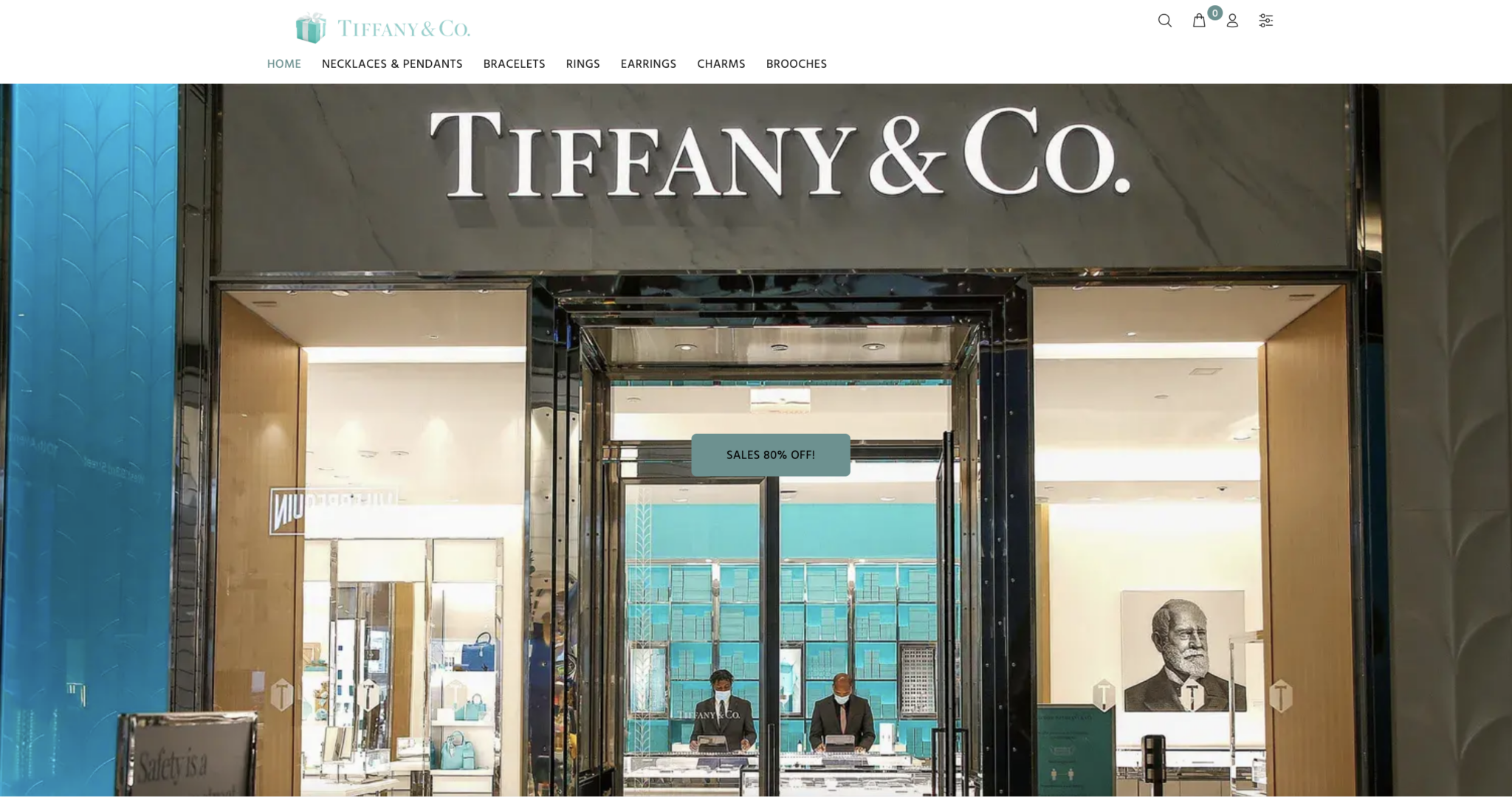
While TiffanyCoShop[.]com doesn’t have any spam reports as of yet (likely due to its young domain age) and no presence on Trustpilot, it’s highly suspected to be a scam site due to these obvious warning bells:
- Not the official Tiffany & Co. website: One of the most significant indicators that TiffanyCoShop[.]com is a scam site is the clear warning from the genuine Tiffany & Co. The official website explicitly states that their products are exclusively sold through their official country-specific platforms. They also emphasize that they only work with reputable platforms like Net-a-Porter and FarFetch as outside sellers.
- Selling Tiffany merchandise at unusually low prices: Tiffany & Co. is a high-end luxury brand, and its merchandise is typically very expensive. If you come across a website offering Tiffany merchandise at remarkably low prices like TiffanyCoShop[.]com, it’s likely a scam.
- Limited sitemap and missing About Us section: A sitemap is a comprehensive list of all the pages on a website. A thorough About Us section should provide information about the company, its products or services, and its contact details. TiffanyCoShop[.]com has a restricted sitemap and lacks a comprehensive About Us section which raises suspicions of being a scam.
- Non-functioning social media links: The social media links on TiffanyCoShop[.]com only take one to the social media platform, not a specific page, which is a strong indication that the website isn’t legitimate.
- Suspicious payment processing site: If the payment processing on a website is routed through a suspicious payment site, it’s a red flag indicating that the website is not legitimate. Scammers frequently employ fake payment sites to steal people’s credit card information.
- Young domain registration: The fact that the domain was registered in April 2023, and the registrar is Name Cheap, suggests that the website is very new. Additionally, Name Cheap is a popular domain registrar that is sometimes used by scammers.
3. Omitages[.]com
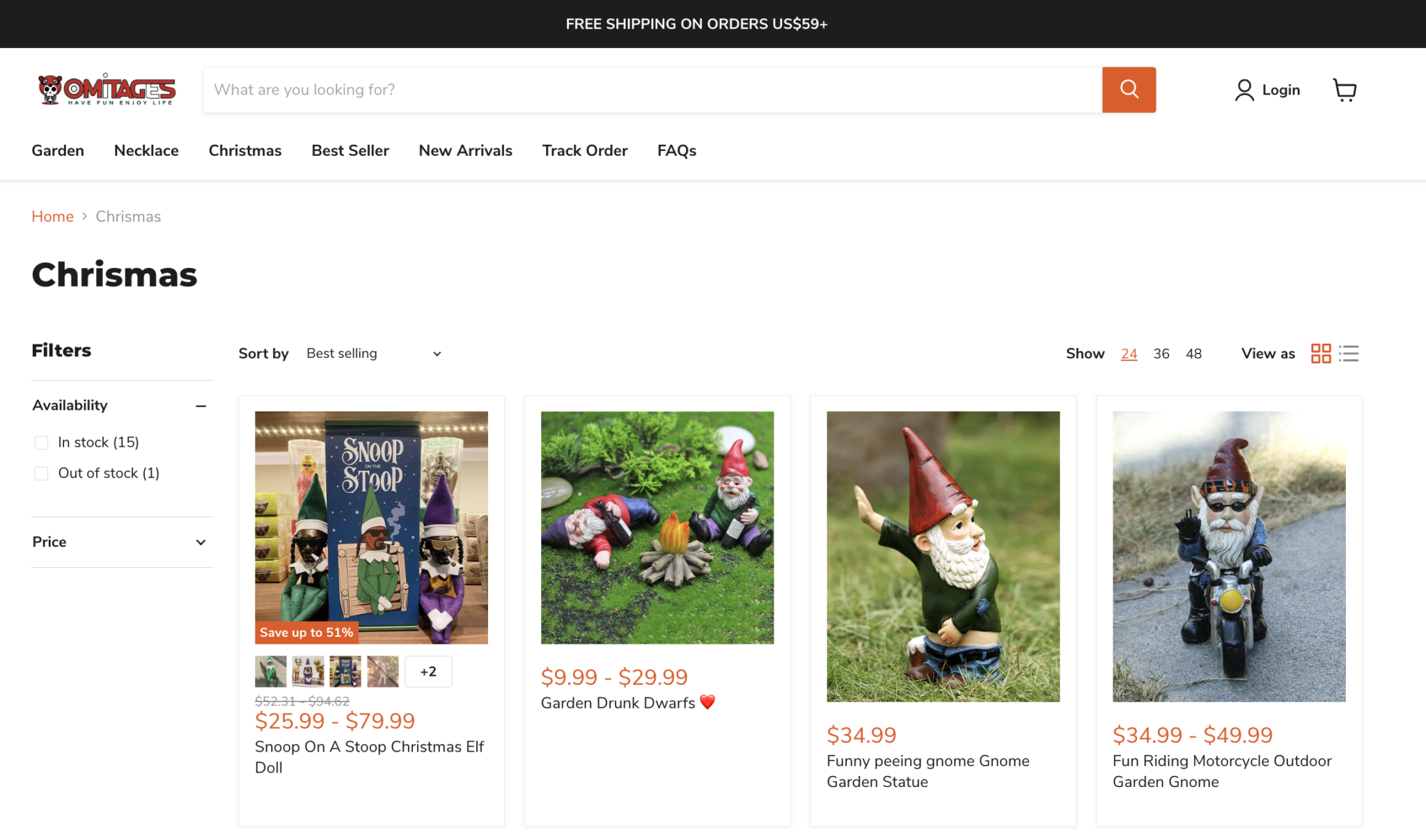
If you’re a fan of ornamental garden gnomes and other household trinkets, then you may want to stay away from omitages[.]com. Here are just some of the reasons why it’s suspected to be a scam shopping site:
- The website is very new: Omitages[.]com was registered in September 2022, which is a red flag for any online business.
- Low trust rating: According to Trustpilot, Omitages[.]com has a rating of 1.0 out of 5 stars. Numerous customers have complained about receiving counterfeit products, never receiving their orders at all, and experiencing difficulty obtaining refunds.
- Poor grammar and spelling throughout: A dead giveaway of an unprofessional or potentially fraudulent website.
- Lack of contact information: The only means of contacting the company is through an online form. There is no phone number or email address listed, which can be concerning for customers seeking support.
- Suspicious return policy: The website’s policy requires all returns to be shipped back to China, at the customer’s expense. This is not a standard practice and indicates potential issues with the company’s operations.
- Unusually low prices on products: If the prices seem too good to be true, it’s a strong indication that customers should exercise caution.
4. Morrity[.]com
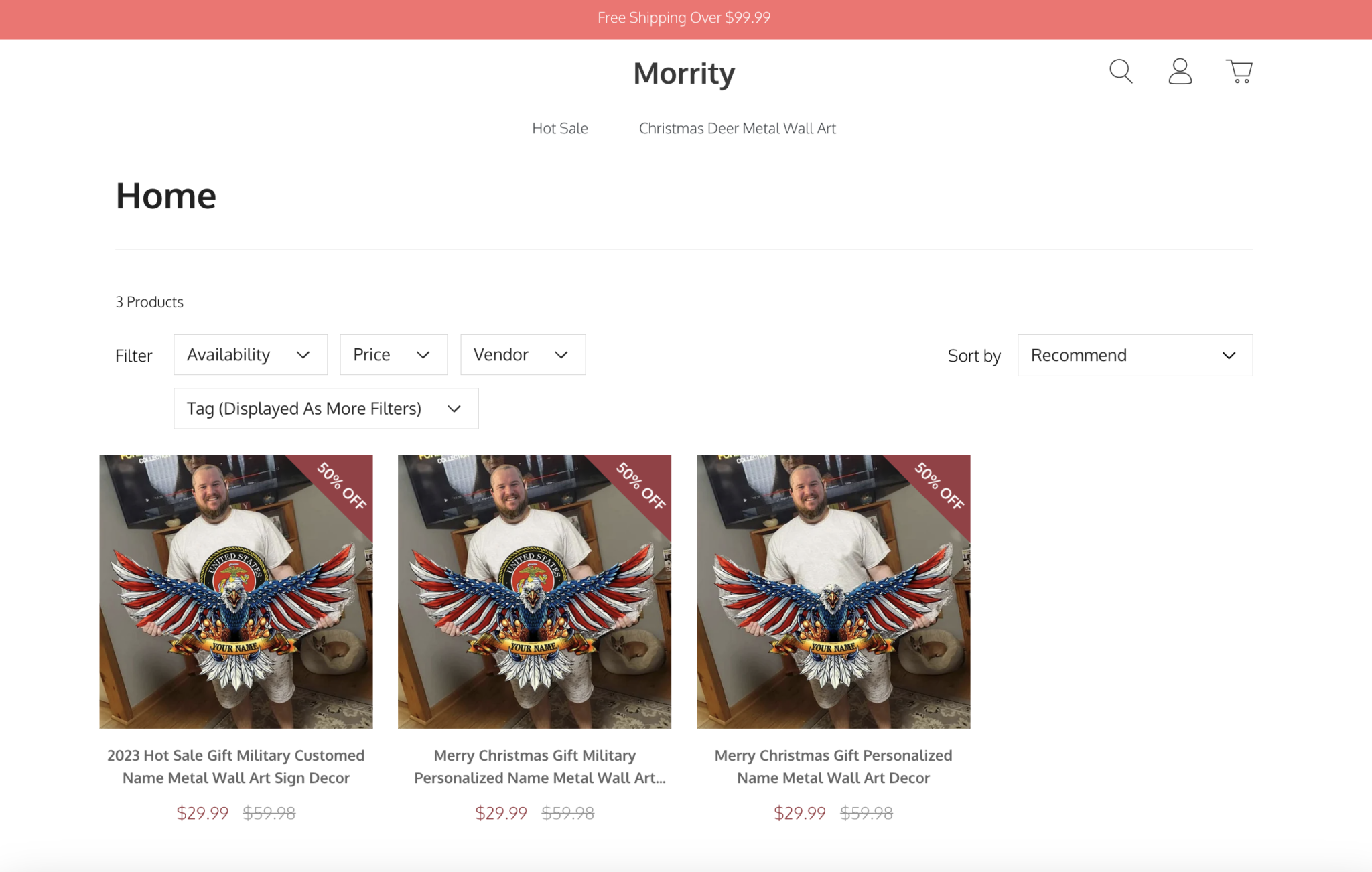
Morrity[.]com is an alleged player in the bustling wall art industry, however, several concerning indicators emerge when evaluating the site. These red flags raise doubts about the legitimacy and credibility of the platform:
- Poor website design: The website is poorly designed and lacks elements in the metadata that could enhance its online presence. This deficiency in quality design and optimization raises questions about its credibility and overall quality.
- Questionable product list: There seems to be only one item for sale.
- Unusually low prices: Morrity[.]com offers products at prices that seem unusually low for the wall art industry, which should raise a few eyebrows.
- Limited payment options: The website provides only a restricted set of payment options, which may limit the convenience and security of customers.
- Lack of contact information: Morrity[.]com offers no contact information other than a suspect email address. Additionally, there is no presence on social media platforms, which makes it challenging for customers to establish trust.
5. MyFaceBoxer[.]com

MyFaceBoxer[.]us is a website offering customizable socks and underwear, allowing customers to print their own or a loved one’s face on these items for a unique and playful gift—perfect for Christmas or Valentine’s Day. The company claims to be based in Hong Kong and allegedly ships globally. However, there are suspicions surrounding its legitimacy, even though it’s not been definitively confirmed as a scam site.
Warning signs include:
- Hidden owner identity on WHOIS: The website owner concealed their identity when registering the site.
- Low visitor traffic according to traffic flow stats: This points to either a lack of investment in marketing or advertising or the website being flagged by search engines. Both are clear signs of a potential scam shopping site.
- Dubious use of customer reviews and images: The website features customer reviews and images taken from legitimate sites, misleadingly presenting them as their own.
- Dodgy Trustpilot reviews: While the company’s Trustpilot reviews aren’t all bad, many of the positive comments appear automated or repetitive, indicating potential bot-generated or purchased feedback. The negative comments also consistently report that items were never delivered.
- Heavily discounted items raise suspicion: All items are suspiciously discounted, often significantly below prices offered by legitimate wholesalers for similar items.
- Limited feedback opportunities on social media: While the company has a presence on Facebook and TikTok, comments and reviews have been disabled, potentially preventing customers from leaving feedback.
- Flagged as possible fraud on Scamadviser: Users have flagged this site as a possible fraud on Scamadviser, a platform dedicated to exposing dodgy sites, further raising concerns about its legitimacy.
6. Sheingivesback[.]com

Sheingivesback[.]com is a misleading landing page posing as an official representative of the popular e-commerce platform, Shein. This deceptive site is just one example of an ongoing trend where scammers exploit the trust associated with reputable brands.
- Fake program: This dubious product reviewing program has gained rapid traction, enticing users with the promise of gift cards in exchange for signing up at Sheingivesback[.]com. It leverages the popularity of the e-commerce giant, offering unsuspecting victims the opportunity to claim 750 USD worth of vouchers for Shein products, in exchange for a product review.
- Bait-and-switch tactics: Victims are coerced into engaging in various tasks and deals, some of which require credit card details, before receiving the promised gift card. This scheme is a classic example of a phishing scam.

- Suspected malware: The redirect page is suspected to contain malware. Clicking on survey buttons or answering questions on this page could inadvertently lead to malicious software being installed onto users’ devices.
- TikTok promotions: Popular TikTok videos serve as a platform for this scam, drawing in users with the prospect of generous rewards for a simple sign-up. However, upon doing so, users are redirected to scam URLs like rewardsgiantusa[.]com, where their details are maliciously collected.
7. Emmarelief[.]com

Emmarelief[.]com claims to offer a solution for digestive problems through their Emma supplement. However, despite its somewhat legit-looking website design, several signs suggest that the site isn’t what it claims to be.
- Customer reviews: the company has 46 reviews on Trustpilot and a dismal score of 2.0. Over 76% of the reviews are negative, stating poor customer service and lengthy shipment delays. What’s worse, is that those that did receive the product reported severe stomach upset issues.
- Questionable TikTok endorsements: Positive TikTok reviews appear to be heavily influenced, casting doubt on their authenticity.
- Low trust score: The site scores a dismal 1 out of 100 on ScamAdviser, raising significant red flags regarding its legitimacy.
- Unrealistic claims: The site’s bold promises regarding digestive health should be taken with a healthy dose of skepticism.
- Missing information: The absence of ingredient information and scientific backing leaves a gaping hole in the site’s credibility.
- Design flaws: Despite the fact that it’s a somewhat decently designed website, Emmarelief[.]com is riddled with grammatical errors. Its contact information is also elusive.
8. Luvasti[.]com
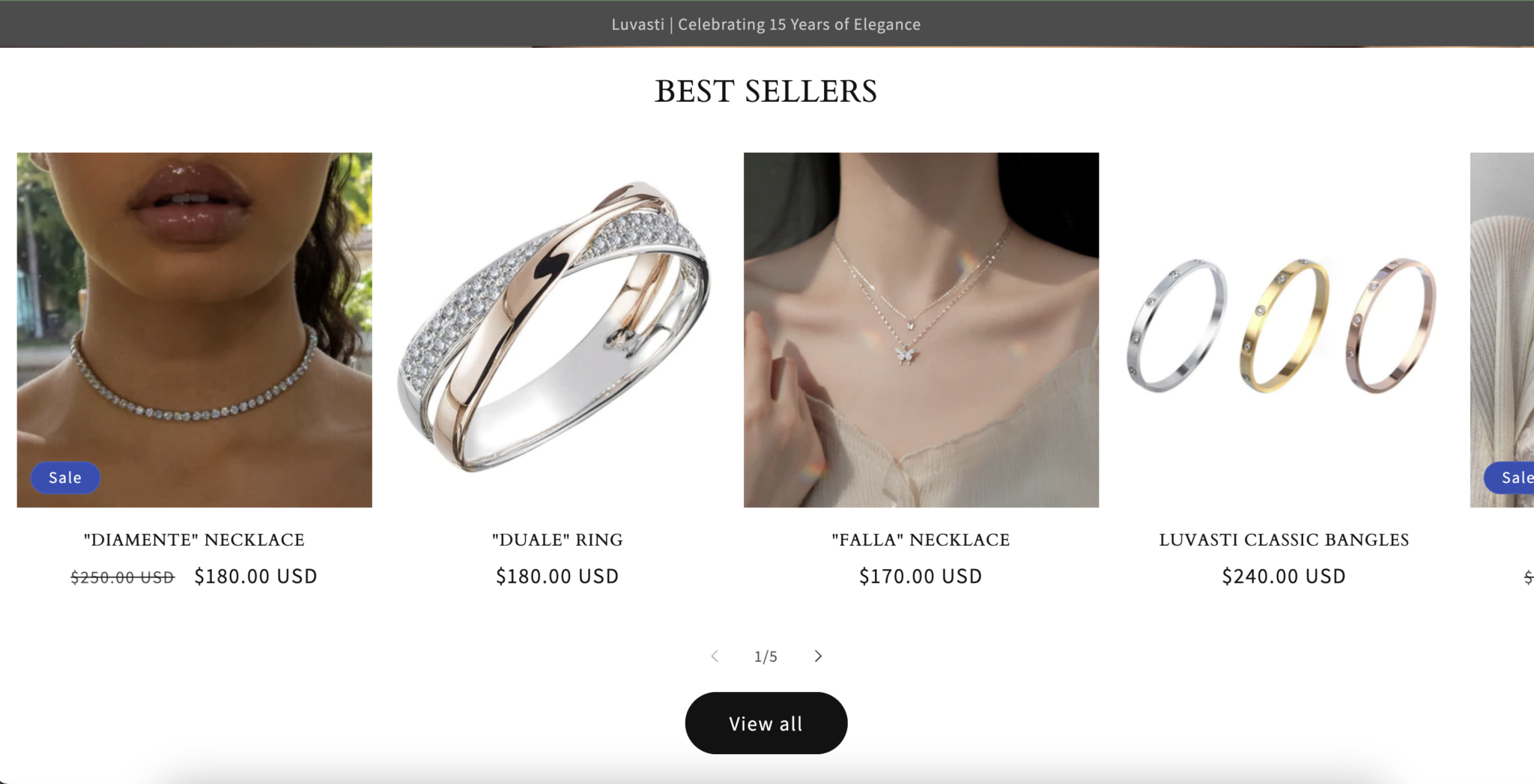
Luvasti[.]com, an online jewelry store, has raised concerns about its legitimacy. The site used a now-deleted TikTok account to offer exclusive discounts, but this seems to be a tactic to encourage purchases without real intent to deliver.
- Copied legal pages: The Terms of Service, Privacy Policy, and About Us sections on the website are directly copied from known scam sites. This is a common tactic to create an illusion of legitimacy, but these policies likely offer little to no actual protection for users. Even the images are unlawfully taken from other reputable retailers.
- Zero contact information: This site doesn’t provide any customer service phone number, physical address, or live chat support. This blatant lack of contact details leaves customers with no means to communicate with the company about any issues.
- Anonymous company: Only registered in July, the identity of the owners or operators of Luvasti[.]com isn’t disclosed. This complete lack of transparency raises significant concerns and casts doubt on the site’s trustworthiness for purchases or data handling.
- No social media presence: Reputable brands actively engage with customers through various social media platforms. The complete absence of any social media accounts linked to Luvasti[.]com is highly unusual and adds to the suspicion surrounding the site.
9. BedBathClose[.]com
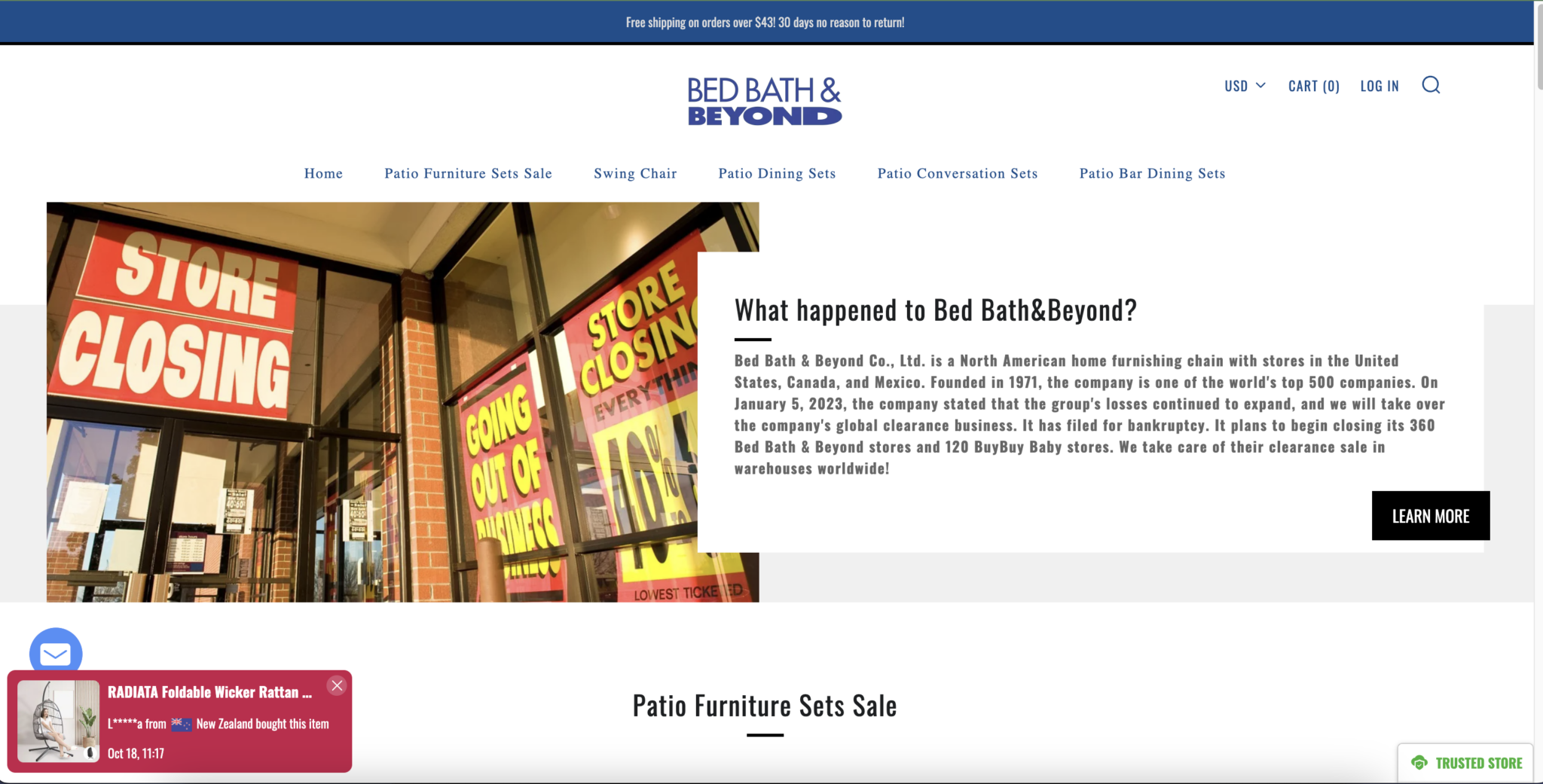
BedBathClose[.]com is a deceptive website masquerading as the well-known retailer Bed Bath & Beyond. This fraudulent site exploits Bed Bath & Beyond’s recent bankruptcy announcement and store-closing sale, offering massive discounts that are simply too good to be true.
- Unrealistic discounts: BedBathClose[.]com offers discounts ranging from 50-80% on a wide range of home goods, including furniture. These discounts are far beyond what would be considered realistic for high-quality furniture items.
- Poorly constructed site: BedBathClose[.]com is a badly built site and lacks the professional polish seen on a legitimate retail website. This includes weird font, issues like broken links, inconsistent layouts, and overall clunky navigation.
- Plagiarized images: The scammers behind Bedbathclose[.]com appear to have lifted images directly from the legitimate Bed Bath & Beyond website, as well as used screenshots from the site. This has made them grainy and pixelated.
- Fake trusted score rating: The site has a “trusted store” rating on the bottom right of the page, which is self-assigned and lacks endorsement from any recognized authority. This tactic is a typical strategy used by scam sites to falsely convey trustworthiness.
10.BrookShoeOutlet[.]com
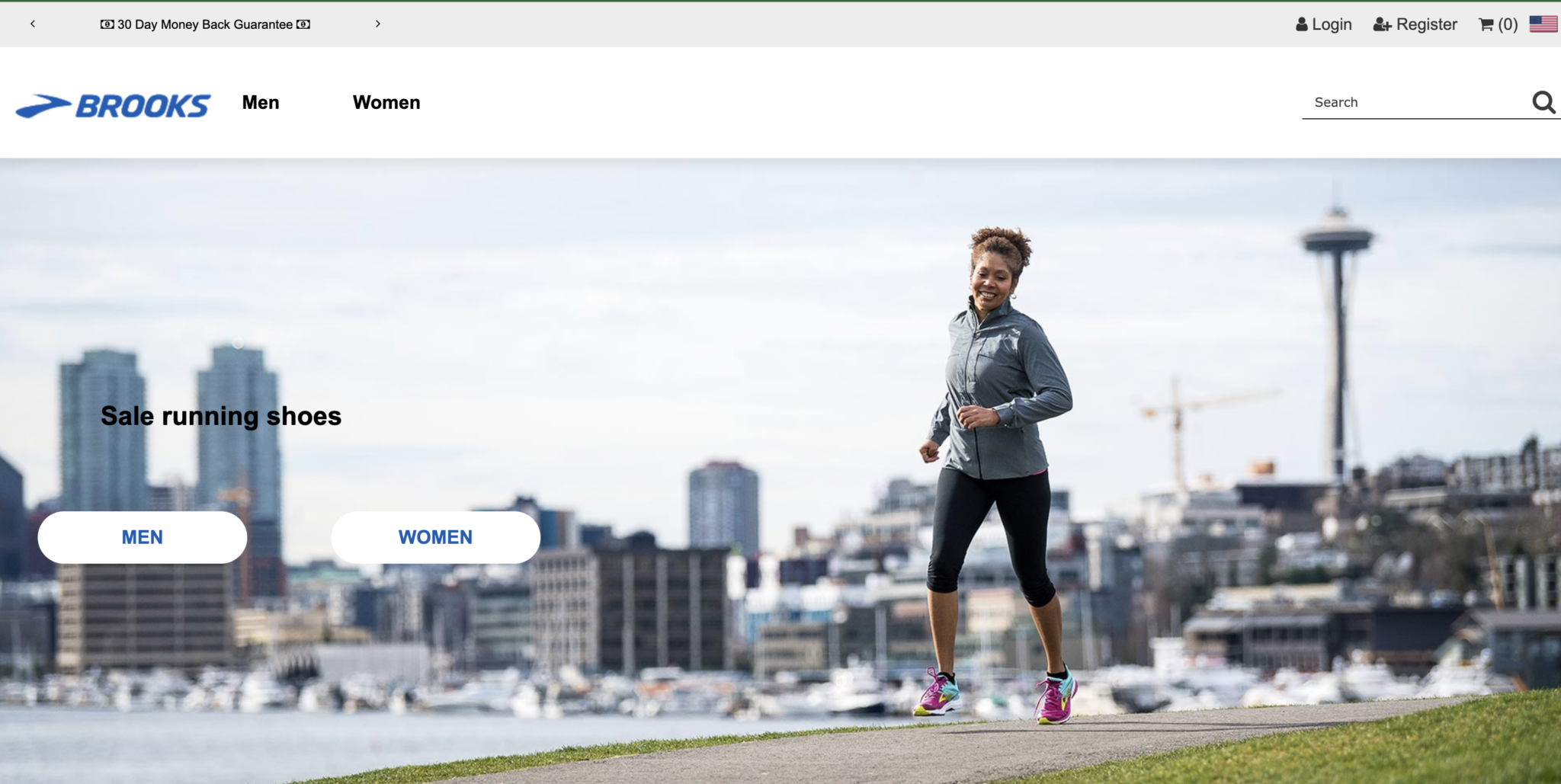
BrookShoeOutlet[.]com is a known scam site with a dismal 1.8 rating on Trustpilot, characterized by an overwhelming number of negative reviews. A few customers said they received a low-quality necklace instead of the expected shoes—a common tactic that scammers use to prove they delivered an item when questioned.
- It is not an authorized retailer of Brooks shoes: Brooks has confirmed that they do not have outlet stores and that their only official website is brooksrunning.com.
- Numerous complaints: There are numerous complaints and inquiries about whether this Brooks outlet site is legit.
- Too-good-to-be-true deals: Brooks shoes are relatively expensive, so it’s unlikely that a legitimate retailer would be selling them at a significant discount.
- Limited shoe selection: Instead of offering a wide range of shoe models characteristic of a legitimate retailer, BrooksShoeOutlet[.]com only lists the most popular and highly searched-for shoe models.
- Suspicious contact information: BrooksShoeOutlet[.]com lacks clear and trustworthy contact information. Instead of a legitimate business address, phone number, or official email, it provides a generic Outlook address.
- Substandard website design and navigation: The design and navigation of the BrooksShoeOutlet[.]com website is noticeably poor, lacking the professionalism expected from a legitimate online store. This includes difficulties in finding information and a lack of intuitive navigation.
11. SueWhitehurst[.]shop
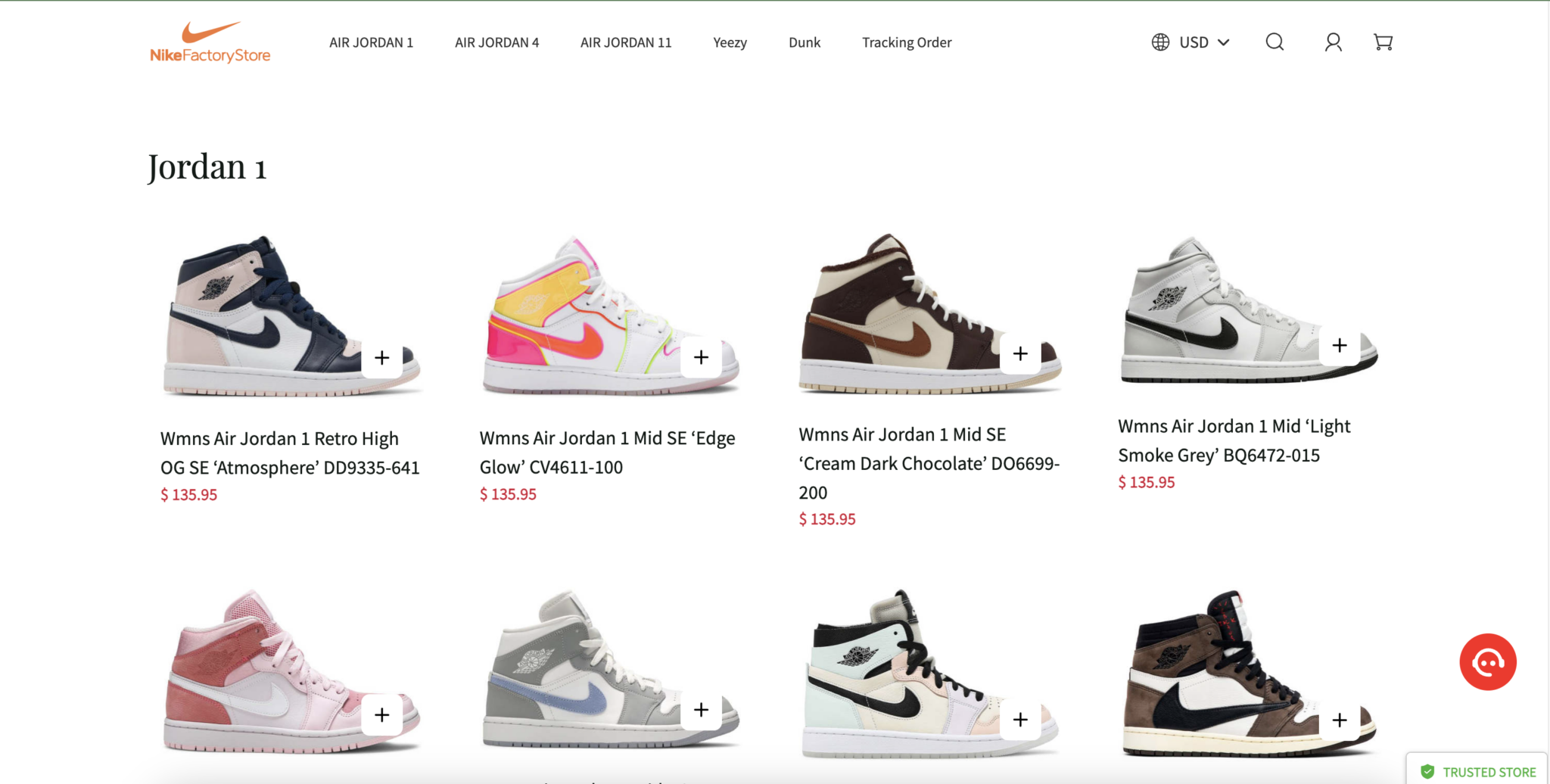
SueWhitehurst[.]shop lures customers in with its promise of authentic Nike Air Jordan shoes at discounted prices. However, once customers place their orders, they’re often left disappointed.
- Misuse of Nike’s branding: SueWhitehurst[.]shop is not affiliated with or authorized by Nike in any way, but it uses the Nike name, logo, and images of Air Jordan shoes to lure victims into thinking it’s a legitimate Nike retailer.
- Poor customer satisfaction: Customers report never receiving any products after placing orders or receiving low-quality knockoffs instead of real Nike items.
- Recent domain name registration: SueWhitehurst[.]shop’s domain was registered very recently, a common tactic of scam sites looking to execute short-lived schemes before being shut down.
- Fake contact information: The provided contact information on the site is fake, leaving customers with no legitimate way to reach the company should issues arise with their orders.
- Unrealistic discounts: The discounts offered on the site are highly unrealistic. Legitimate companies can’t maintain such extreme markdowns, suggesting the presence of counterfeit or deceptive goods.
- Stolen product information and images: SueWhitehurst[.]shop showcases product information and images taken from other major retailers, revealing a lack of effort in creating an original website or unique products.
- No social media presence: The absence of any social media presence is unusual for a legitimate company, adding to the suspicion surrounding the site’s authenticity.
12. WilkoClosing[.]com

WilkoClosing[.]com is a fake website that claims to be selling Wilko products at clearance prices. The scam works by luring shoppers in with unrealistic discounts of up to 90%. Once a shopper places an order, they are either not sent anything at all, or they receive cheap counterfeits, used or tampered goods, or completely wrong items. In some cases, victims have also reported their personal and payment information being stolen.
- Unrealistic discounts: Genuine retailers rarely offer more than 50% off at maximum. Discounts above 70% or 90% are almost always scams.
- No valid contact information: WilkoClosing[.]com has no valid customer service phone number, physical address, or live chat. This lack of contact details prevents reaching anyone with issues.
- Opaque ownership and operation details: The site completely lacks transparency about who owns or operates the business. Opaque sites should never be trusted with purchases or data.
- Sloppy website: Overall, WilkoClosing[.]com is a badly designed website with misspellings, grammatical errors, and inconsistent formatting.
- Stolen product images: Reverse image searching product images from WilkoClosing[.]com often reveals that they are stolen from other sites.
- Reliance on social media ads and influencer posts: WilkoClosing[.]com relies on Facebook/Instagram ads and fake influencer posts to lure in victims rather than organic traffic. This is because the site has been flagged by Google so it doesn’t feature as a search engine result.
13. OnlineHokaSale[.]com
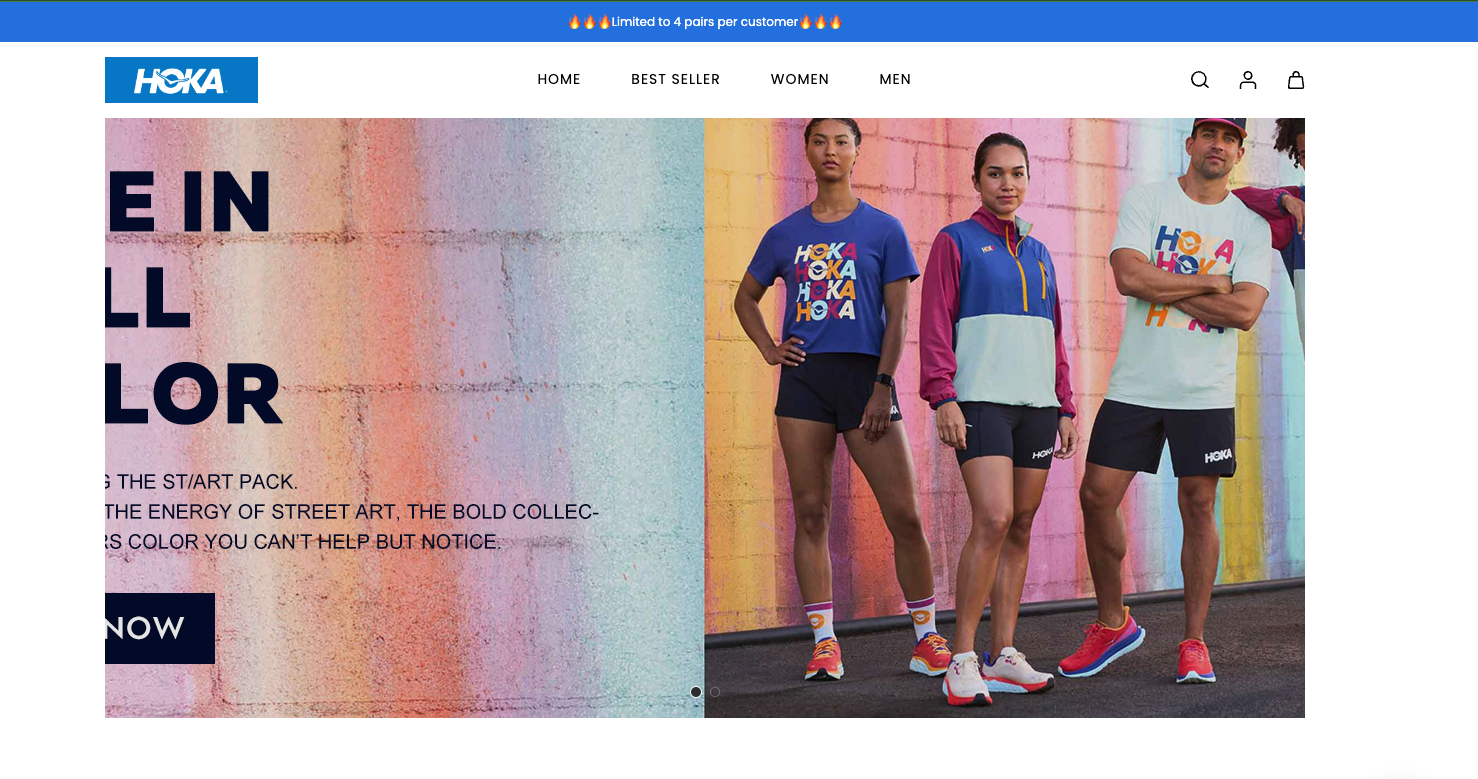
OnlineHokaSale[.]com is one of the many scam websites that claim to sell Hoka shoes at discounted prices.
- The website is new: According to Whois, the domain name OnlineHokaSale[.]com was registered in June 2023—it’s common for scammers to create new websites all the time before they’re pulled down, in order to evade detection.
- Poorly designed: The website has a number of grammatical errors and typos, and the overall design is unprofessional. Even the hero image is cut off on the homepage, indicating that it was lifted.
- Company info is lifted: The scammers didn’t try hard when it comes to the sitemap. The information under Our Story and Our Impact are screenshots from the official Hoka website. The legal pages, including the Shipping Policy and Return Policy, are also lifted.
- Unrealistic claims: The website claims to sell Hoka shoes at significantly discounted prices, for example, they’re selling a pair of Women’s Bondi 8 that retails for 165 USD for the random amount of 39.89 USD.
- No contact information: The website does not have a physical address or phone number listed. It only has a questionable email, faq@onlineemailhoka[.]com listed.
- Fake reviews: All the reviews featured on the site are fake, and likely made up by the scammer or lifted from genuine Hoka retailers.
14. Walofficials[.]com
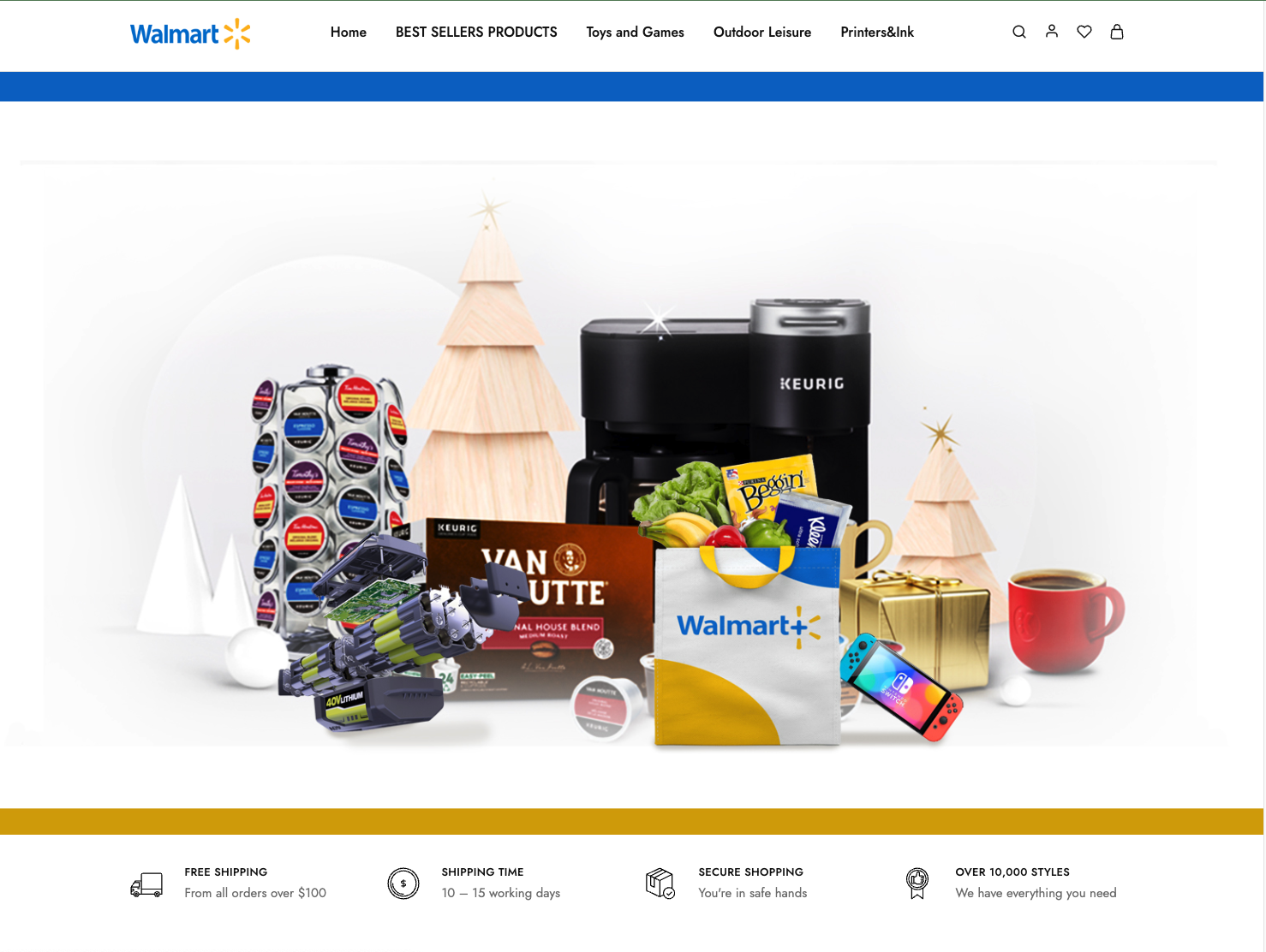
Walmart scams are on the rise, and Walofficials[.]com is just one example. This is because scammers know that people are more likely to trust a website or call that claims to be from Walmart. Walmart also sells a variety of products at competitive prices which can easily lure unsuspecting victims in.
- Ridiculously low prices: The website offers products at prices that are too good to be true, such as 5 USD for a 50 USD product.
- Stock photos: Walofficials[.]com uses stock photos instead of unique product images, which is a sign that the products may not be real or that the website is simply copying and pasting content from other websites.
- Bad grammar/spelling: The site is riddled with grammatical and spelling errors, which is another sign of a scam.
- High-pressure sales tactics: Walofficials[.]com uses high-pressure sales tactics to urge customers to purchase immediately, such as by claiming that products are in limited supply or that prices will go up soon.
- Weird-looking URL: The website has a strange-looking URL that only includes half the company’s brand name. It also uses the word “official” in an attempt to look more legitimate than it is.
15. Zamzbuy[.]com
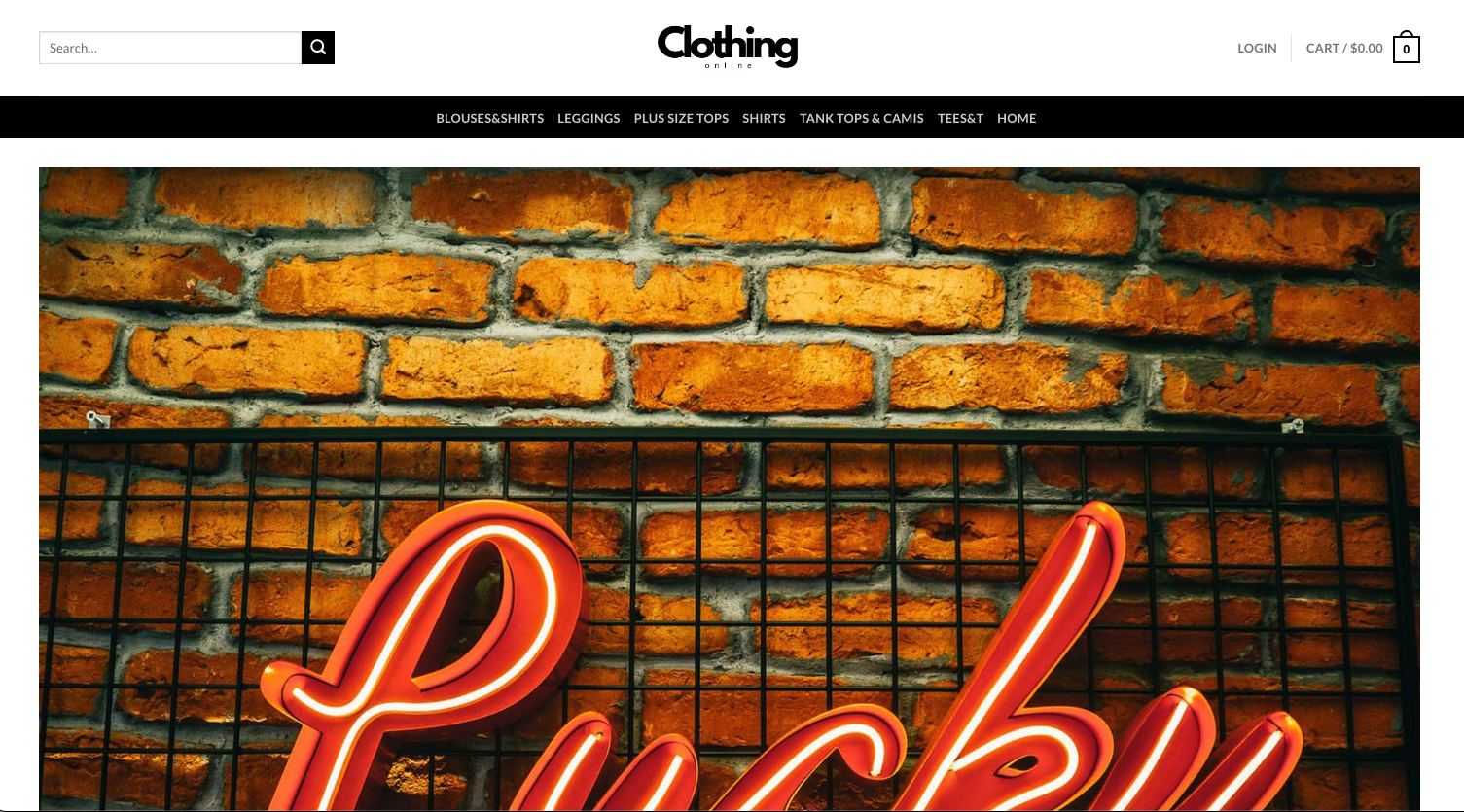
The Zamzbuy[.]com scam tricks customers through spam emails and phony social media ads, leading them to make purchases on the deceptive site. After paying, victims often receive nothing, substandard items, or damaged goods instead of what was promised. When customers seek help or refunds, they are typically met with silence or blocked accounts.
- Part of a scam network: Research suggests that Zamzbuy[.]com is part of a larger interconnected scam network, known for managing various fake shopping sites to defraud customers.
- Copied legal pages: The Terms of Service, Privacy Policy, About Us, and other legal pages on the website are copied from other fake sites and are full of grammar and spelling mistakes.
- Negative reviews: While there aren’t many reviews of Zamzbuy[.]com online yet, likely due to its young domain age, there are a few complaints on third-party sites where customers complain about placing an order and never receiving their item.
- Unrealistic discounts: The website offers extreme discounts to entice shoppers. For example, they offer seemingly good-quality shirts for 2 USD which is too low for what the item would be worth.
- Copied content: All product information and images are stolen from other major retailers. For example, their product images have directly been lifted from AliExpress and Shein.
- No social media presence: Genuine brands engage with customers on social media. Zamzbuy[.]com’s complete absence from social media platforms is highly suspicious.
Other suspected scam shopping sites
Scam sites pop up swiftly—especially close to shopping holidays—and disappear just as quickly, making it a challenge to compile a definitive list. At the time of publishing, these 10 sites were also identified as likely scams:
1. Zorasoul[.]co
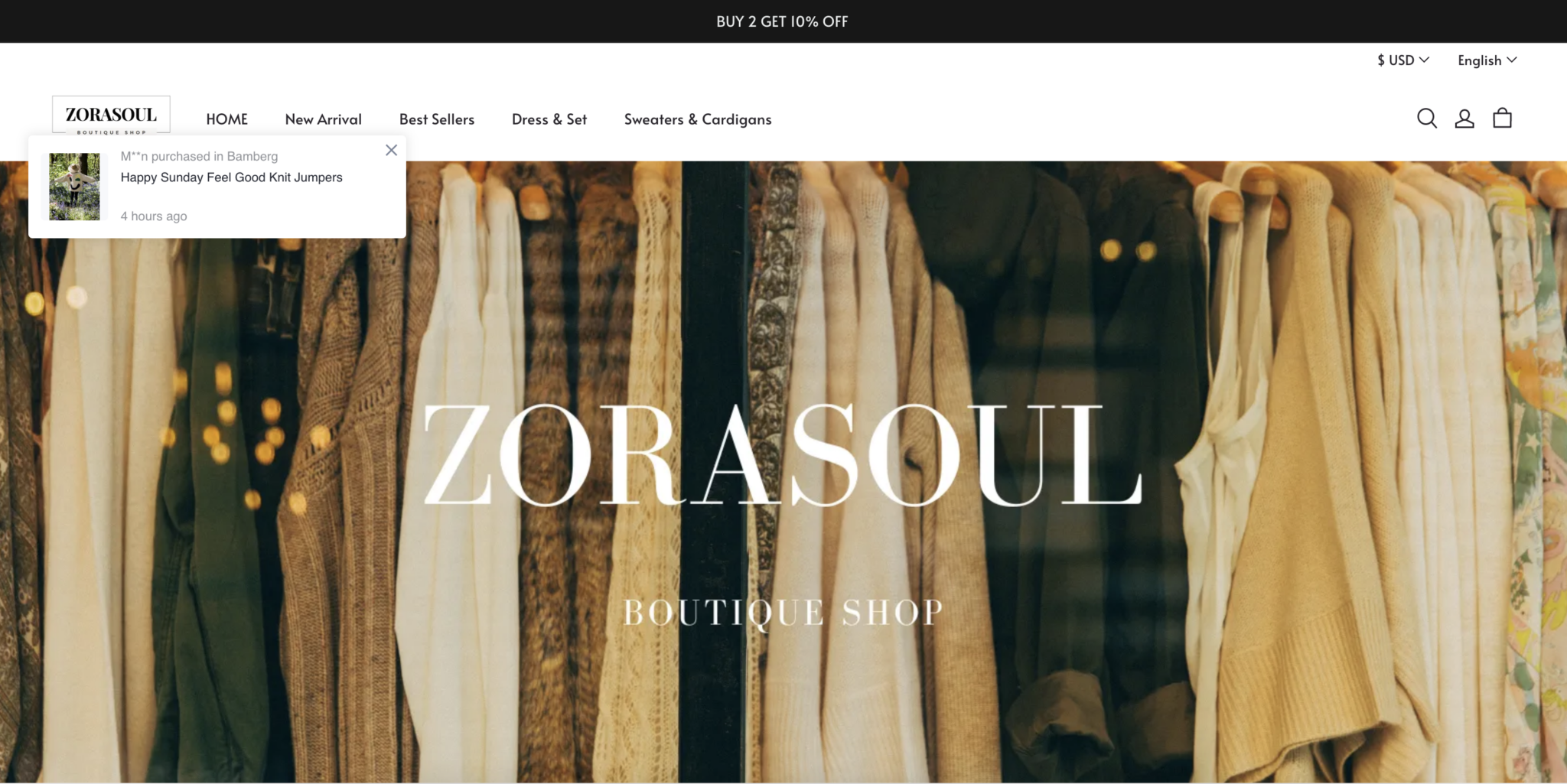
Like most of the sites above, Zorasoul[.]co is a deceitful online store that poses as a legitimate retailer offering heavily discounted products. However, it’s a scam operation that tricks customers into making purchases and divulging personal information. The scammers promote the site through spam emails and social media platforms, using low prices and stolen product images to lure in unsuspecting shoppers. Zorasoul[.]co unlawfully collects customers’ sensitive data during checkout, putting them at risk of identity theft or fraud. The website also exhibits multiple red flags, such as copied legal pages, no contact information, and young domain age.
2. Yssemk[.]com

Yssemk[.]com is a deceitful online store scamming customers since at least 2022. It offers a range of products at suspiciously low prices, including women’s fashion and electronics. Reports abound of customers receiving fake or subpar goods. The lack of legitimate contact information, numerous grammatical errors, and limited payment options, excluding major methods like credit cards or PayPal, are significant red flags. This makes refunds challenging if one falls victim to the scam.
3. VolcomLifeStyle[.]com

VolcomLifeStyle[.]com is a scam website selling fake Volcom products. It lures in victims with deceptive promotions, such as unbelievably low prices and buy-one-get-one-free deals. However, once customers place their orders and pay their money, they never receive their products. The website also blocks customers who complain, making it difficult to get a refund. The site also lacks legitimate contact information and has copied legal pages. Negative reviews confirm its fraudulent nature.
4. Trendcraftleather[.]com

Trendcraftleather[.]com claims to sell various leather products, such as jackets, bags, and wallets, at very low prices. However, customers who order products from the site often receive counterfeit or inferior goods or nothing at all. In some cases, customers have reported that their orders have been shipped to the wrong address. If you try to contact Trendcraftleather.com about a problem with your order, you’re likely to be ignored. The company does not have a working customer service phone number or email address.
5. TheGeneralSwas[.]top

Formerly used to run a Ponzi scheme that claimed to offer a variety of services, including stock trading, cryptocurrency trading, and forex trading, the scam website now uses the URL to “sell” trendy caps. However, the site is poorly designed and contains a number of red flags that suggest it is a scam. For example, the website’s terms of service and privacy policy are both plagiarized from other websites. Additionally, the website’s customer support team is non-existent, as is its social media presence.
6. Vivianhan[.]com

Vivianhan[.]com operates as a scam by offering children’s toys and Festive Season trinkets at suspiciously low prices, aiming to lure in customers, gather their payment and personal details, and then fail to fulfill orders. Several warning bells confirm its fraudulent nature: firstly, it provides no genuine contact information, with a fake address and phone number listed on its contact page. Additionally, the product images are stolen from other sources, and the legal pages are copied from elsewhere. Negative customer reviews further emphasize the scam, with numerous complaints of undelivered orders circulating online.
7. Sideoutfit[.]com
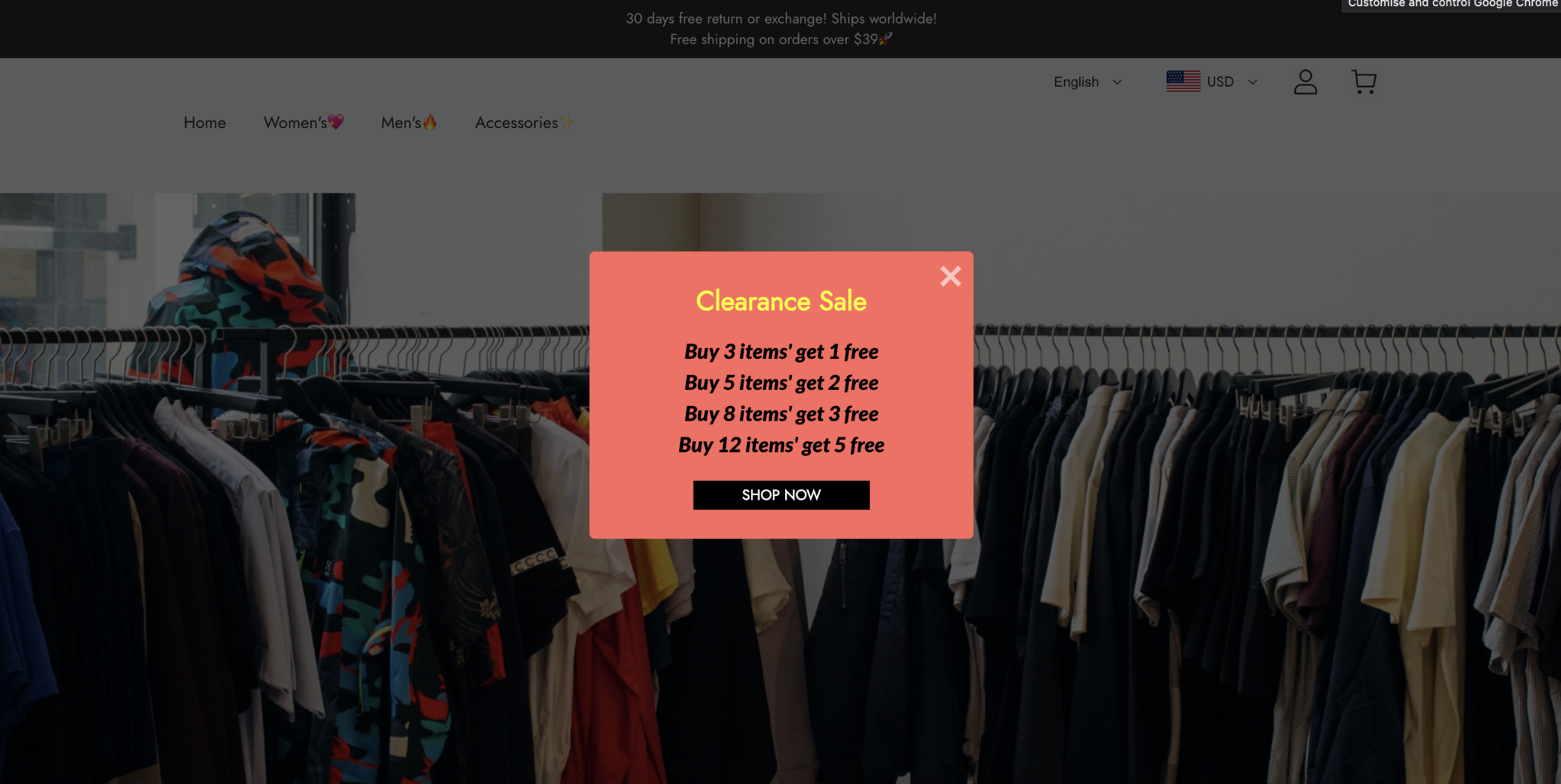
Sideoutfit[.]com is a deceptive online store that falsely offers products at remarkably low prices, but in reality, it’s a scam operation. This fraudulent site advertises branded clothing and accessories at unrealistically low costs, enticing customers to place orders. After obtaining payment and personal information, Sideoutfit[.]com either sends counterfeit or substandard goods or simply nothing at all. Complaints from customers are often ignored and promised refunds never materialize.
8.Rayem[.]shop
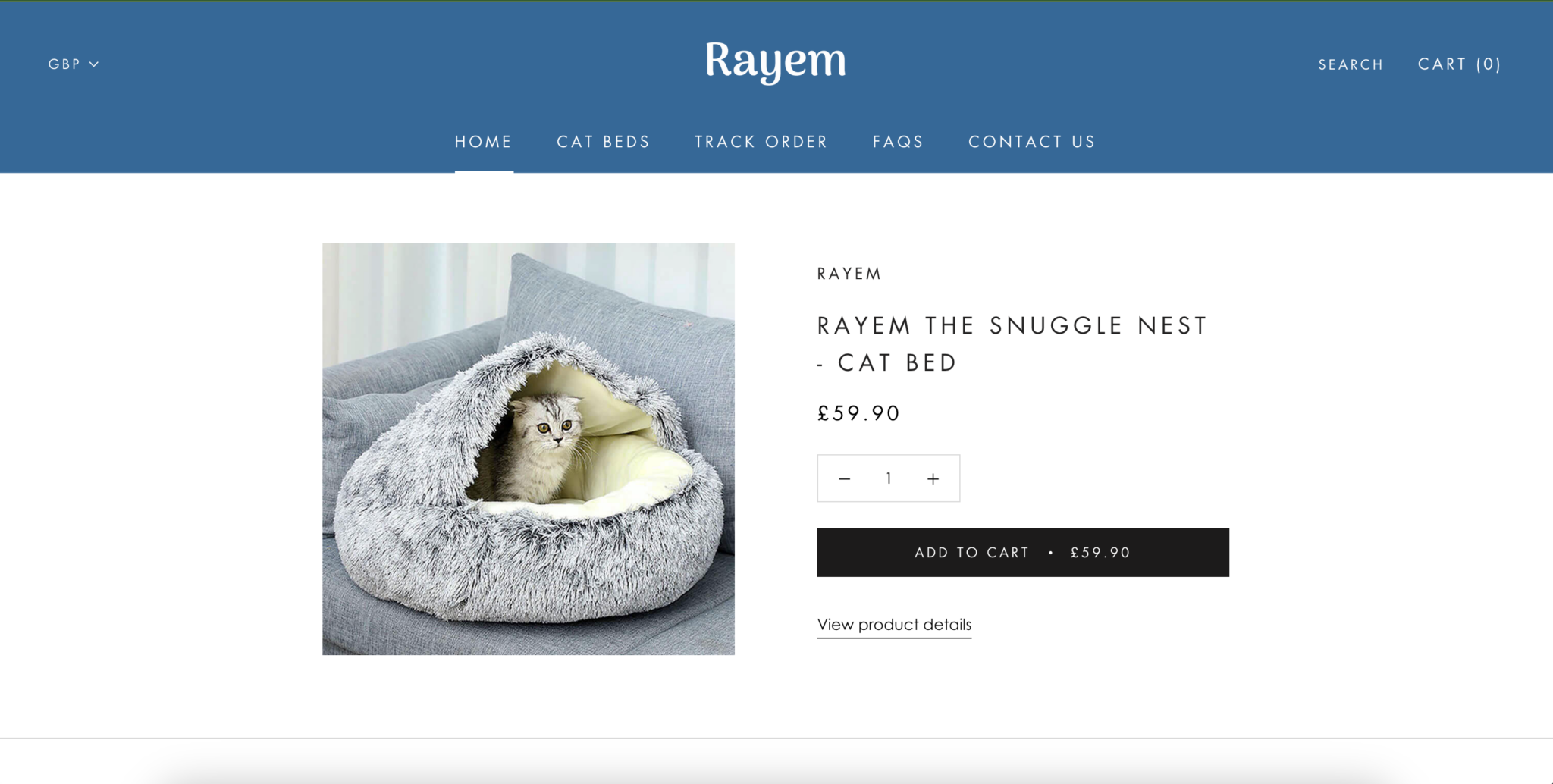
Rayem[.]shop deceives pet owners with unrealistically low prices on products like cat and dog beds, and toys. It takes payments but fails to fulfill orders, even blocking customer complaints. The absence of valid contact details, stolen images, and copied legal pages confirm its fraudulent nature. This underhanded approach allows the scam to persist while evading accountability.
9. Randlion[.]com
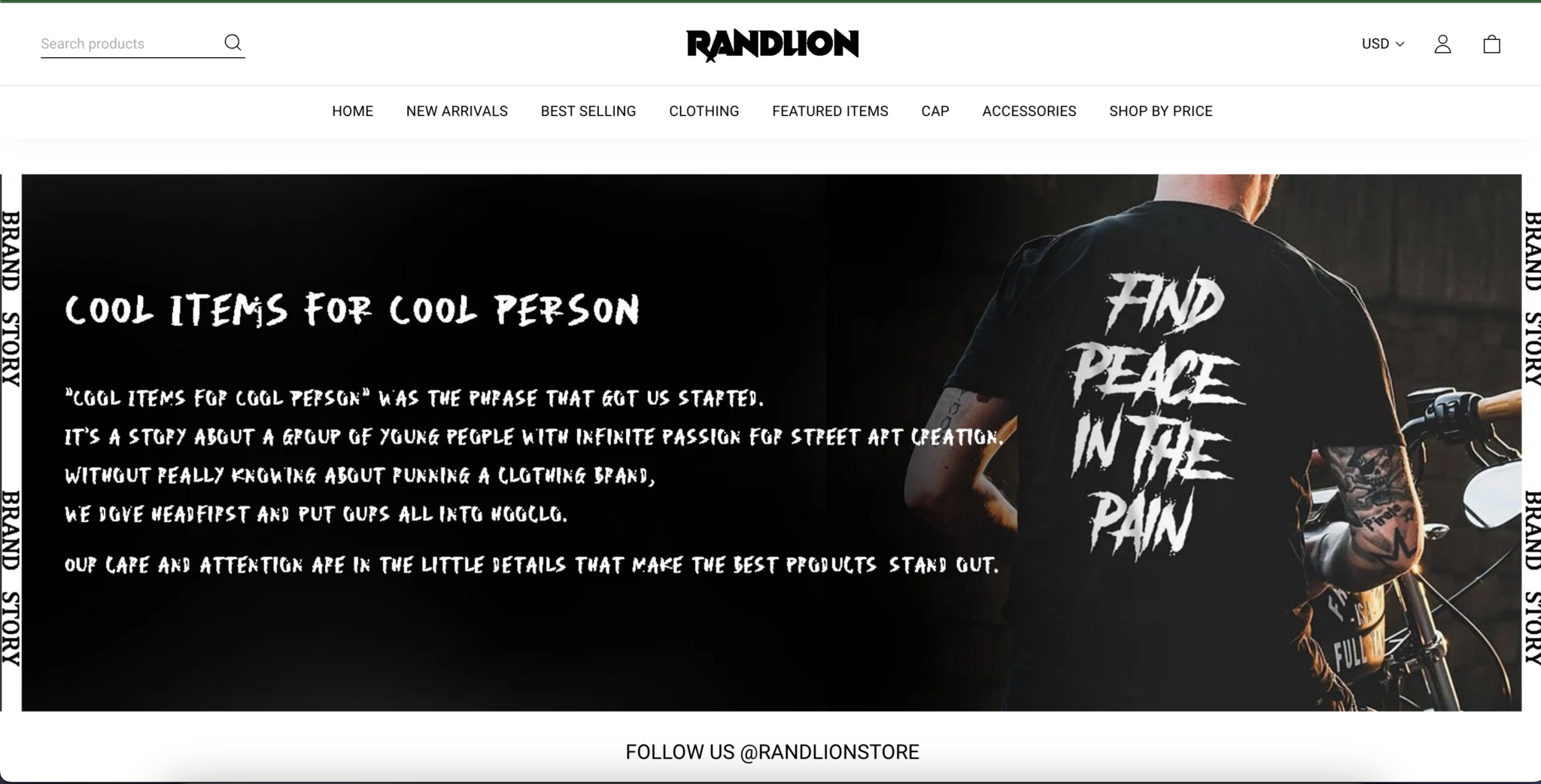
Randlion[.]com operates a classic bait-and-switch scam, claiming to offer low-priced t-shirts with crude messages but failing to deliver the goods. The website exhibits several signs of typical online shopping scams: it lacks legitimate contact information, employs stolen product images, and copies legal pages from other sources. Additionally, the prices offered are unrealistically low, a clear indicator of deceit. Positive customer reviews on the site are likely fabricated, further confirming it’s a fraud.
10. Pouliga[.]com

Pouliga[.]com is a scam website that sells counterfeit and inferior car accessories. Using spam emails and social media platforms like Facebook, Instagram, and TikTok to promote the site and lure in victims, Pouliga[.]com entices customers with unrealistic deals, then either sends them nothing at all. The website has no legitimate contact information, stolen product images, and copied legal pages. Additionally, it has a number of negative reviews from customers who have been scammed.
How to avoid being scammed when shopping online
Scammers are constantly coming up with creative ways to swindle victims out of their hard-earned cash, so it’s important to take steps to protect yourself. Here are a few ways to avoid scam websites when shopping online:
- Shop with trusted retailers: Stick to well-known and established online stores that have a good reputation. Avoid shopping on websites that you’ve never heard of before or that look unprofessional.
- Look for the HTTPS lock: When you’re on a website that’s secure, you’ll see a padlock icon in the address bar and the URL will start with “https://” instead of “http://”. This means that your information is encrypted and protected from hackers.
- Beware of phishing emails: Scammers often send phishing emails that look like they’re from legitimate retailers. These emails may contain links to fake websites or ask you to enter your personal information. Never click on links in emails or enter your personal information unless you’re sure you’re on the real website of the retailer.
- Be careful about social media ads: Scammers often use social media ads to promote fake products or websites. Be wary of any ads that offer products or prices that seem too good to be true.
- Read customer reviews: Before you buy anything, read customer reviews to see what other people have said about the product and the retailer. If you see a lot of negative reviews, it’s best to avoid the product or retailer.
- Be careful about what information you share: Only share your personal information with retailers that you trust. Avoid giving out your Social Security number or credit card information unless it’s absolutely necessary.
- Do your research: If you’re buying something from a new or unfamiliar retailer, take some time to research them online. Read reviews from other customers and see if the retailer has a good reputation.
- Be suspicious of deals that seem too good to be true: If you see a product that’s priced significantly lower than it is on other websites, it’s probably a scam.
- Don’t wire money to sellers: Wiring money is like sending cash, and it’s very difficult to get your money back if you’re scammed.
- Use a secure internet connection: Avoid shopping online when you’re using public Wi-Fi, as these networks are less secure.
Learn more about how to identify fake shopping websites.
Encrypt your traffic with a VPN
One of the best ways to protect yourself from identity theft when shopping online is to use a VPN—this is especially true during shopping holidays like Black Friday and Cyber Monday when scammers are out in full force. A VPN encrypts your traffic and hides your IP address, making it difficult for scammers to track your activity and know your location. Lots of high-quality VPN providers like ExpressVPN offer a Black Friday VPN deal to help you stay safe all year round.
(Note that a VPN won’t protect you from entering your information into a scam site or downloading malware.)
What to do if you buy something from a scam shopping site
If you think you’ve bought something from a scam shopping site, don’t panic. There are steps you can take to try to get your money back and protect yourself from further harm.
- Step 1: Contact your bank or credit card company immediately. Tell them that you think you’ve been scammed and that you’d like to dispute the charge. They may be able to help you get your money back.
- Step 2: You might want to cancel the credit card you used. If the site’s goal was to collect your credit card details, it would have set up the form in an unsecured way where it could see everything you’ve entered.
- Step 3: Report the scam to the Federal Trade Commission (FTC). The FTC collects information about scams and uses it to investigate and prosecute scammers. You can report a scam online at ReportFraud.ftc.gov.
- Step 4: If you used the same password for your online banking or credit card accounts as you did for the scam shopping site, change your passwords immediately. This will help to protect your accounts from being hacked.
- Step 5: Monitor your credit report for any unauthorized activity. You can get a free copy of your credit report from each of the three major credit bureaus once a year at AnnualCreditReport.com. Review your credit report carefully for any accounts that you didn’t open or transactions that you didn’t make. If you see anything suspicious, contact the credit bureau immediately.
Additionally, if you made the payment for the fraudulent transaction using a gift card, reach out to the issuing company to inquire about a possible refund. If you sent money via wire transfer to the scammer, contact your bank to explore options for retrieving the funds.
If you provided the scammer with sensitive personal information like your Social Security or credit card number, get in touch with the Social Security Administration or the credit bureaus promptly to implement a fraud alert or credit freeze on your accounts. This will help safeguard your credit record and future financial interests.
FAQ: About scamming websites
How can I check if a website is legit?
There are a few things you can do to check if a website is legit:
- Look for the HTTPS padlock icon in the address bar: This means that the website is using encryption to protect your data.
- Check the website’s security certificate: You can do this by clicking on the padlock icon. The certificate should include the name of the website owner and the issuing certificate authority.
- Verify the domain: You can use a WHOIS lookup tool to find out who owns the website domain. If the domain is registered to a private individual or company, or if the registration information is hidden, this could be a red flag.
- Check the contact page: A legitimate website should have a contact page with a valid email address and phone number.
- Look for trust seals: Trust seals are images that are displayed on websites to indicate that they have been certified by a trusted third-party organization. Just be careful of scammers who plant their own trust seals that aren’t backed up, as this is a common scam tactic.
- Read online reviews: If you are unsure about the legitimacy of a website, you can read online reviews to see what other people have said about it.
How do I know if a link is safe?
There are a few things you can do to check if a link is safe:
- Hover your cursor over the link to see the full URL. The full URL should match the link text. If the link text says one thing but the URL says something else, this could be a red flag.
- Look for the HTTPS padlock icon in the address bar. This means that the website you are being linked to is using encryption to protect your data.
- Use a link checker tool. There are a number of free and paid link checker tools available online. These tools can scan links for malware and phishing threats.
- Be careful about clicking on links in emails or social media posts. Scammers often send emails and social media posts with links to malicious websites. If you are not sure whether a link is safe, do not click on it.
If you’re unsure whether a link is safe, it’s best to err on the side of caution and not click on it.
Can someone go to jail for scamming online?
Yes, someone can go to jail for scamming online. In the U.S., online scams are typically prosecuted under federal laws such as the Wire Fraud Act and the Mail Fraud Act. The maximum sentence for wire fraud is 20 years in prison, and the maximum sentence for mail fraud is five years in prison. The actual sentence a person receives if convicted will depend on the specific facts of the case, such as the amount of money defrauded and the defendant’s prior criminal history.
In addition to federal laws, many states also have laws that prohibit online fraud. The penalties for online fraud under state law can vary depending on the state.
What is the most trusted online shopping site?
Amazon is generally considered to be the most trusted online shopping site. It’s a large and well-established company with a good reputation for customer service and security. Amazon also offers a wide variety of products and competitive prices.
Other trusted online shopping sites include:
- eBay
- Walmart
- Target
- Best Buy
- Home Depot
- Macy’s
- Nordstrom
- Etsy
- Wayfair
- Overstock
When choosing an online shopping site, it is important to consider the following factors:
- Reputation: Choose a site with a good reputation for customer service and security.
- Product selection: Make sure the site has the products you are looking for.
- Prices: Compare prices from different sites before you make a purchase.
- Shipping costs: Consider the shipping costs when making your purchase.
- Return policy: Make sure the site has a generous return policy in case you are not satisfied with your purchase.
You can also read online reviews to get more information about different online shopping sites.
It’s important to note that no online shopping site is completely safe. However, by following these tips, you can minimize the risk of fraud and other problems.
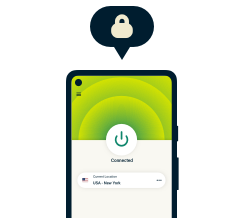
Protect your online privacy and security
30-day money-back guarantee


























Comments
J S Carbonne is a fake online shoe store. Items never delivered and when dispute raised they said it had been delivered and that I should check with my neighbours if it had gone there by mistake. A few days later, after threatening to lodge a dispute, I received a completely different item (cheap plastic wallet instead of the 2 pairs of leather shoes I ordered). Wallet package had same tracking number that they said shoes were sent with. Their contact email was then suddenly no longer active.
PayPal investigated and refunded my money after I sent photos of the wallet received and the packaging displaying the tracking number of the package they said they sent my shoes in. What completely baffles me is that their website is still there and active and presumably still stealing people’s money! Why aren’t these sites taken down when they are reported as scams??
Another that looks suspicious to me is Cortexsandals[.]com, as they are using the “Williams” logo and have shoes for sale (that I know are out of stock everywhere else) in every size and at very low prices. No contact details and suspicious text. Same set up that tricked me last time. Never again! Please beware these scam sites.
I just bought this Pro Power Save as advertised by Elon Musk. I read the directions and it read like someone who speaks broken English. So many mistakes. English was poor. In the advertisement it said that the Supreme Court has allowed this product to be sold even if it claims that it supposedly takes away monies from our Electric Power Companies. There were several famous people standing alongside Musk endorsing this product. Is this product a scam?
Hi – the product you mention does not appear to be associated with Elon Musk, so it’s a scam. We don’t know what effect it might have on your electricity bill though.
If they are on Facebook most are shame
i would urge people to avoid transferring any money to WOrld Remit- i was scammed recently and it was impossible to contact anyone on this site to stop the money transfer –
Online shops like drschollsshoes(.)com is a scams. Be careful. I ordered shoes that were on sale but received no tracking number, no order was received.
Also nurse’s mate shoes are are scam you will receive no package. Apart from Amazon, Macy’s, Walmart, and Target, I buy no online products I rather go to the store for hundreds of dollars wasted already for online shopping. Be warned, guys. Go to the store instead and get your goods.
I did not purchase from this company VIKRASSETH(.)COM, but a charge from them showed up on my charge card bill and when I disputed it they came up with a tracking number to my house. They are in China and the tracking said it only took 20 days to get here. They are a scam company to beware of.
Ordered on line from Charles Tyrwhitt Uk…..gib’ ven order and tracking number with China Post….order never arrived.UK said it was a scam ..paid with credit card Company shown Kosaes Shop Hong Kong?
www[.]developedes[.]online
Avoid this website!!!!!! I ordered a jacket claimed to be delivered it hasn’t been. Tried emailing them not response.
Avoid
quickfareshop
Watch out!! That is credit card fraud! There will be no shipment. Try to find the address of the company!! There is none!
I found another website scam I thought people should be aware of. Forkitchenstore(.)com looks legitimate but when I ordered something from them I never received it nor did I get a reply from the multiple emails I sent. Then I get a message from PayPal stating the site is a scam when I went back to click on the order confirmation. Beware of this kitchen site and stay away.
Damn, just ordered from them lol did you ever get your money back through PayPal?
I saw a clone Steve Madden site yesteday. I was searching for a specific pair of shoes. At first I thought it was an outlet. I clicked out. I don’t want to posttheir link but it is one of the first 10-15 hits on google for the brand’s boots.